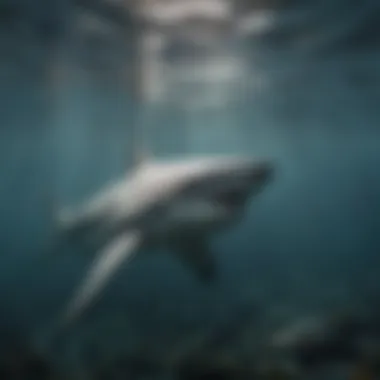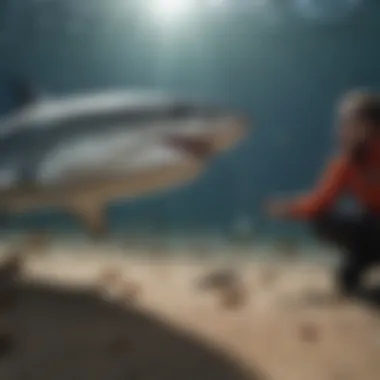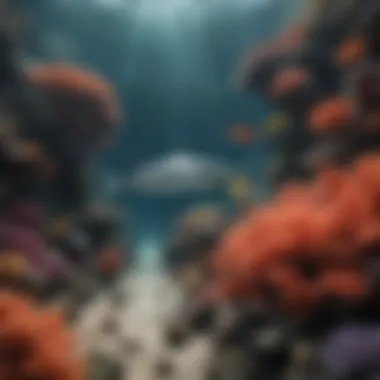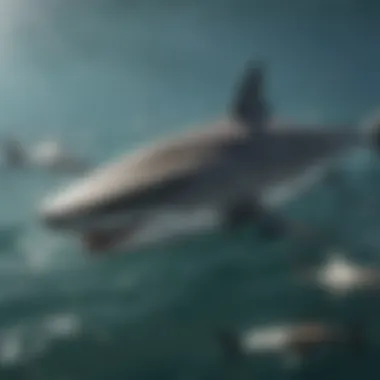Shark Conservation Organizations: A Comprehensive Overview


Intro
Shark populations are experiencing significant declines due to overfishing, habitat loss, and climate change. The conservation of sharks is crucial, not only for their survival but also for the health of marine ecosystems. Many organizations across the globe are dedicated to the protection and restoration of shark species. These organizations operate with various strategies and initiatives, working against significant challenges presented by modern fishing practices and illegal trade.
Furthermore, ongoing research provides valuable insights into shark behavior, biology, and the ecosystems they inhabit. Understanding these dimensions is key for effective conservation efforts.
This article aims to explore the landscape of shark conservation organizations, focusing on their roles, functions, and the effectiveness of their initiatives. Through a detailed examination, we will shed light on the importance of these organizations in advocating for shark populations and marine conservation.
Preface to Shark Conservation
Shark conservation emerges as a pressing concern due to the rapid decline of shark populations worldwide. The strategies and efforts aimed at preserving these vital marine species are essential not just for their survival but also for the health of ocean ecosystems. Understanding shark conservation requires a multi-faceted approach that addresses the role of sharks in their habitat, the threats they face, and the collaborative efforts of various organizations dedicated to their preservation.
The significance of this topic cannot be overstated. Sharks are apex predators and play a crucial part in maintaining the balance of marine ecosystems. Their decline can lead to significant disruptions within these environments, affecting biodiversity and the health of other marine life. Consequently, this article will explore the functions and initiatives carried out by numerous shark conservation organizations, emphasizing both global and local efforts geared toward sustainable practices.
Understanding the Importance of Sharks
Sharks are not merely elusive creatures of the deep; they are integral to the oceanic ecosystem. These species often regulate the prey populations, promoting a balance within marine habitats. For example, by keeping the numbers of smaller fish in check, sharks help to maintain the health of coral reefs and other vital ecosystems. Amidst growing environmental changes, such as overfishing and habitat destruction, the role of sharks becomes increasingly critical.
The survival of sharks also bears substantial significance on socio-economic scales. Many communities rely on healthy ocean ecosystems for fishing industries and tourism. The loss of shark populations could severely impact these sectors, illustrating how intertwined conservation efforts are with human livelihoods. The understanding of their importance thus extends beyond ecological concerns, encompassing broader socio-economic implications.
Threats to Shark Populations
Shark populations face an array of threats, primarily driven by human activities. These threats can be categorized into several key areas:
- Overfishing: This is perhaps the most significant threat. Many shark species are caught at unsustainable rates, primarily for their fins, meat, and other body parts. This practice severely impacts their populations, contributing to their vulnerable status.
- Habitat Loss: Coastal development, pollution, and climate change lead to the degradation of essential shark habitats. The loss of breeding and nursery areas further diminishes their population recovery prospects.
- Bycatch: Sharks are often unintentionally captured in fishing gear targeting other species. This incidental capture can lead to significant losses, as many of these sharks do not survive release.
- Pollution: Pollution not only degrades their habitats but also affects the health of sharks. Toxic substances accumulate in their bodies, impacting their reproductive success and overall well-being.
The combination of these threats paints a stark picture of the struggles faced by shark populations today. It urges a thorough examination of conservation measures essential to ensure their survival in an ever-changing world.
Overview of Shark Conservation Organizations
Shark conservation organizations play a significant role in safeguarding marine biodiversity. These entities engage in various activities aimed at protecting shark species, which are crucial to marine ecosystems. As apex predators, sharks regulate the populations of other marine life, helping to maintain the balance within their habitats. The decline in shark populations poses a threat not only to these species but to the broader health of ocean environments. Organizations dedicated to shark conservation address these complex issues through advocacy, education, and direct action.
Additionally, these organizations provide a platform for researchers, policymakers, and the public to come together. Collaborative efforts enhance awareness of the pressing challenges facing sharks in today's oceans. Their work also sheds light on the interconnectedness of species within the marine ecosystem, informing effective conservation strategies.
Types of Conservation Organizations
Shark conservation organizations vary widely in their focus and approach. They can be broadly categorized into non-governmental organizations (NGOs), academic research institutions, government agencies, and community-based groups.
- NGOs such as the Shark Trust and Shark Advocates International focus primarily on policy advocacy, community outreach, and public awareness campaigns. They often work with local communities to manage sustainable practices that protect shark populations.
- Academic institutions, like those involved in marine biology research, contribute scientific knowledge. They conduct studies on shark behavior, reproduction, and population genetics. This research underpins policy proposals and conservation programs designed to safeguard sharks.
- Government agencies play a crucial role in implementing regulations. They oversee compliance with international agreements aimed at protecting endangered shark species.
- Community-based organizations engage local populations in conservation efforts. By fostering a sense of ownership and responsibility, these groups encourage sustainable practices that benefit both local communities and shark populations.
Global vs. Local Efforts
The efforts to conserve sharks can be viewed through two lenses: global initiatives and local actions. Global organizations address issues that transcend national borders, such as illegal fishing and international trade. Prominent groups like the Wildlife Conservation Society work on global campaigns to highlight regulatory gaps and push for comprehensive policies aimed at shark protection.
Local efforts are often implemented by communities directly impacted by shark populations. For instance, coastal regions may collaborate with organizations to develop sustainable fishing practices. Local knowledge can be invaluable in creating effective conservation strategies that take into account the specific ecological and socio-economic contexts of an area.
Notable Shark Conservation Organizations
Shark conservation organizations play a crucial role in the ongoing efforts to protect and preserve shark species and their habitats. These organizations advocate for research, sustainable practices, and policies that address the decline in shark populations. Among the myriad of organizations dedicated to this cause, a few stand out due to their impactful initiatives, broad reach, and dedicated advocacy. Understanding these organizations provides insight into the collaborative efforts that drive shark conservation forward.
Shark Trust


The Shark Trust is a prominent organization based in the United Kingdom. Founded in 1997, it aims to promote the conservation of sharks and rays through education, research, and legislation. The organization works closely with governments and local communities to implement effective conservation strategies. One key aspect of the Shark Trust's mission is to raise awareness about the ecological importance of sharks within marine environments.
"Sharks are often misunderstood. They are not merely dangerous predators but vital components of ocean health."
The Shark Trust engages in various research projects designed to monitor shark populations and develop sustainable fishing practices. Their partnership with fisheries aims to establish better management and conservation protocols. Additionally, the trust supports educational programs aimed at schools and the public, emphasizing the need for conservation efforts.
Wildlife Conservation Society
The Wildlife Conservation Society (WCS) extends its efforts beyond terrestrial wildlife, including a focus on aquatic ecosystems where sharks play a critical role. Founded in 1895, WCS has made significant contributions to global shark conservation through programs that address marine biodiversity and fishery management. WCS employs a science-based approach, utilizing research to inform policy and conservation practices.
One of WCS's notable initiatives includes the development of the Shark and Ray Conservation Program. This program focuses on protecting under-threat species, assessing their populations, and promoting public engagement with shark conservation. Collaborating with local communities and governments, WCS seeks to create sustainable fishing policies and protect marine habitats.
Oceanic Society
Established in 1969, the Oceanic Society is a non-profit organization that focuses on ocean conservation broadly, with an ever-growing emphasis on shark preservation. Their initiatives involve scientific research, community engagement, and advocacy. Oceanic Society’s programs address critical issues of overfishing and habitat destruction, which are significant threats to shark populations.
Central to their conservation efforts is the Shark Conservation Program. This program conducts field research to understand shark behavior, reproduction, and population dynamics, informing conservation strategies. Aside from research, the Oceanic Society promotes community involvement in conservation activities, emphasizing the role of local populations in protecting marine ecosystems.
Shark Advocates International
Shark Advocates International is an influential organization dedicated to the global conservation of sharks. Their mission involves advocating for effective policy development, raising public awareness, and promoting science-based conservation efforts. Shark Advocates collaborate with a variety of stakeholders, including scientists, policymakers, and local communities, to ensure comprehensive approaches to shark conservation.
Part of Shark Advocates' strategy includes extensive education programs that aim to dispel myths about sharks and inform the public about their essential role in maintaining healthy marine ecosystems. Some initiatives target specific regions to address local challenges in shark conservation, reflecting a tailored approach to advocacy and policy.
In summary, notable shark conservation organizations such as Shark Trust, Wildlife Conservation Society, Oceanic Society, and Shark Advocates International contribute essential resources, expertise, and advocacy necessary for the preservation of shark populations. Their collective efforts highlight the importance of sustained collaboration in addressing the multifaceted challenges facing sharks today.
Key Initiatives in Shark Conservation
The significance of key initiatives in shark conservation cannot be overstated. These initiatives play a critical role in mitigating the threats faced by shark populations worldwide. They not only focus on immediate preservation efforts but also address long-term sustainability strategies that benefit marine ecosystems. Understanding these initiatives provides insight into the complexity of shark conservation and the multifaceted approaches needed to protect these apex predators.
Research Programs
Research programs are foundational to shark conservation. They provide essential data on shark behavior, habitat preferences, and population dynamics. Through efforts like tagging studies, scientists can track migratory patterns of species such as the great white shark and the hammerhead shark. Such data not only contribute to academic knowledge but also inform effective management strategies. Institutions like the Marine Conservation Society conduct research that helps identify crucial habitats that need protection.
Moreover, these programs often collaborate with indigenous communities to gather traditional ecological knowledge, enhancing their effectiveness. With advanced technology, including satellite tracking and genetic sampling, research initiatives have grown more sophisticated. This powerful combination enables a better understanding of the ecological roles sharks play in maintaining ocean health. As research reveals more about the biology of sharks, it aids in constructing a framework for conservation policies that ensure their survival.
Sustainable Fishing Practices
Sustainable fishing practices are another essential element of shark conservation. Overfishing remains one of the most pressing threats to shark populations. Organizations like Oceana work tirelessly to promote best fishing practices, focusing on limiting bycatch—the unintended capture of non-target species. By implementing stricter regulations on fishing methods, such as gillnets and longlines, they aim to minimize the impact on vulnerable shark species.
These practices not only help in preserving shark populations but also benefit broader marine ecosystems. Adopting catch limits based on accurate stock assessments is crucial. Sustainability in fishing addresses the balance between human consumption and the health of marine life. Consumers also play a part in this process; supporting sustainable seafood initiatives can apply pressure on the fishing industry to adopt better practices.
Policy Advocacy and Regulation
Policy advocacy and regulation are vital for the success of shark conservation. Engaging with policymakers can lead to the establishment of marine protected areas (MPAs) and effective legislation that safeguard shark populations. Organizations, such as Shark Advocates International, are at the forefront of advocating for stronger policies that protect sharks and their habitats.
This includes lobbying for international agreements like the Convention on International Trade in Endangered Species of Wild Fauna and Flora (CITES). By restricting trade on endangered shark species, these policies play a key role in reducing illegal fishing activities.
Additionally, effective regulation requires continuous monitoring and enforcement. Collaboration between governments, NGOs, and local communities fosters a shared responsibility for marine stewardship. Awareness campaigns paired with regulatory efforts create a holistic approach to conservation, ensuring that sharks receive the protection they desperately need.
"Sharks are an integral part of healthy oceans. Protecting them through research, sustainable practices, and strong policies is essential for marine ecosystems and human well-being."


To conclude, key initiatives in shark conservation involve a careful blend of research, sustainability, and policy advocacy. These elements work synergistically to combat the numerous threats that sharks face, ensuring that they continue to thrive in the oceans.
Scientific Approach to Shark Conservation
The scientific approach to shark conservation is essential for understanding the complexities of marine ecosystems where sharks play a critical role. Applying scientific principles helps stakeholders and conservation organizations make informed decisions about the best practices for protecting shark populations. Research drives the understanding of how various factors affect sharks and helps in developing strategies that lead to more effective conservation efforts. By using scientific data, conservation programs can identify not only the population dynamics of sharks but also the interconnections within the broader marine habitat.
Ecosystem Dynamics
Ecosystem dynamics refer to the interactions among living organisms, their environment, and each other. Sharks, as apex predators, maintain the balance of marine ecosystems. Their role ensures that species populations remain in check, which contributes to habitat health. When shark populations decline, it can cause an imbalance, leading to the overpopulation of certain species and the depletion of others. This phenomenon has been observed in various marine environments, demonstrating how critical sharks are to maintaining biodiversity.
Ongoing research in ecosystem dynamics often involves:
- Analyzing predator-prey relationships
- Studying population fluctuations
- Monitoring habitat changes over time
Understanding these elements is crucial for developing targeted conservation strategies.
Population Genetic Studies
Population genetic studies play an important part in shark conservation efforts by examining the genetic diversity within shark populations. Genetic diversity is a key indicator of a population's health and resilience to environmental changes and diseases. When conservation organizations understand genetic structures, they can identify key populations that are more vulnerable to extinction.
At the same time, these studies facilitate:
- Identification of distinct populations that may require separate management strategies
- Monitoring of gene flow between populations
- Assessment of the effects of fishing pressure on genetic diversity
The findings from population genetic analyses can influence policy regulations and fishing quotas, ultimately improving the prospects for sustainable shark populations. These scientific methods form the backbone of effective shark conservation initiatives.
Public Engagement in Shark Conservation
Public engagement plays a crucial role in the success of shark conservation efforts. Shifting public perception regarding shark species and their ecological importance directly influences policy changes and funding for conservation activities. As apex predators, sharks maintain the balance of marine ecosystems. Thus, fostering an understanding of this balance can lead to more robust public support for protective measures.
Shark conservation is not solely the responsibility of governmental bodies or conservation organizations. It requires active participation from the public. This includes advocacy through social media, community involvement in local conservation efforts, and individual actions like sustainable seafood choices. Engaged citizens can advocate for policies that address overfishing and habitat degradation, representing a formidable force for positive change.
"A well-informed public is vital to effective conservation. Their voices shape policies and drive action."
Awareness Campaigns
Awareness campaigns serve as one of the foremost strategies to engage the public in shark conservation. These campaigns aim to educate various demographics about the threats sharks face. Well-crafted messages can demystify negative stereotypes surrounding sharks, fostering appreciation rather than fear.
These campaigns use diverse channels, such as social media, public events, and documentaries. They highlight the ecological roles sharks perform and their significance within the marine ecosystem. When people understand that sharks are essential for maintaining healthy ocean environments, they become more likely to support conservation initiatives. Examples of effective campaigns include "Shark Week" produced by Discovery Channel and various social media campaigns spearheaded by organizations like Shark Trust. These platforms can mobilize supporters to participate in conservation activities or lobby for stronger regulations.
Educational Programs
Educational programs form the bedrock of effective public engagement in shark conservation. These programs target schools, local communities, and institutions to cultivate knowledge about marine biology and conservation principles. By educating the younger generation, organizations can instill a sense of responsibility for the ocean and its inhabitants.
Curricula may cover topics such as the role of sharks in marine food webs, the impact of fishing practices, and the importance of biodiversity. Programs often include field trips, interactive workshops, and hands-on conservation activities, enabling participants to connect theory with real-world applications. Organizations like the Oceanic Society run these types of educational initiatives, seeking to bridge the gap between the ocean and the community.
Challenges Facing Shark Conservation
Shark conservation presents numerous challenges that often hinder effective initiatives. Understanding these challenges is vital, as it lays the groundwork for more successful interventions and informs stakeholders of the pressing issues at hand. Multiple factors contribute to the decline of shark populations, making the need for organized conservation efforts more urgent. This section discusses two key obstacles: funding and resource allocation, as well as political and economic hurdles. These elements are intrinsic to comprehending the broader context of shark conservation efforts.
Funding and Resource Allocation


Funding is one of the most critical challenges faced by conservation organizations working to protect sharks. Without sufficient financial support, these organizations struggle to implement necessary programs. Conservation efforts require consistent investment in research, public education, and advocacy campaigns.
Key aspects of funding challenges include:
- Competition for Resources: There are many organizations competing for limited funds. Each organization must demonstrate its effectiveness to attract donations or grants.
- Short-Term Funding: Many conservation projects rely on short-term grants, leading to discontinuity in critical efforts.
- Public Awareness: Without widespread awareness of shark conservation issues, fundraising efforts can be hampered. Many people are unaware of the urgent need to protect these species.
Thus, improving resource allocation can significantly enhance conservation outcomes. Stakeholders must work towards creating sustainable funding mechanisms that ensure long-term support for shark conservation initiatives.
Political and Economic Obstacles
Political and economic factors also obstruct shark conservation efforts. Policies affecting marine ecosystems often reflect broader economic interests rather than environmental priorities. In many regions, the fishing industry wields considerable influence, leading to decisions that undermine shark protection.
Key challenges include:
- Lack of Political Will: Politicians may hesitate to implement strict conservation measures due to pressure from fishing lobbies. This reluctance can stifle effective policy change.
- Global Disparities: Conservation efforts can vary greatly between countries. Nations with weaker regulations may find it easier to exploit marine resources, including sharks.
- Economic Instability: In economically troubled regions, immediate concerns about job security can overshadow long-term ecological considerations. This often leads to overfishing and depletion of shark populations.
Effective shark conservation requires a concerted effort to navigate these political and economic landscapes. This can include working with lawmakers to advocate for stronger regulations and establishing international agreements focused on protecting shark species.
In summary, addressing funding and political barriers is crucial for reinforcing shark conservation initiatives. Recognizing these challenges allows for better resource management and policy development, ensuring that sharks receive the protection they urgently need.
Future Directions in Shark Conservation
The future of shark conservation hinges on innovative strategies that can adapt to the changing realities of marine ecosystems. As research uncovers more complexities regarding shark species and their habitat, the need for forward-thinking solutions becomes paramount. Future directions in shark conservation are not just beneficial; they are essential for the survival of these keystone species. The focus must include technological advancements and increased collaborative efforts among stakeholders.
Technological Advancements
Technological advancements present a powerful tool in the arsenal against the decline of shark populations. These innovations can enhance monitoring, data collection, and conservation measures. The use of satellite tagging is one such advancement, allowing researchers to track migration patterns and population dynamics in real-time. This data-driven approach empowers organizations to make informed decisions about conservation strategies.
Additionally, advancements in drones and underwater robotics provide unprecedented access to marine environments. These tools can conduct assessments in hard-to-reach locations, gathering crucial information without disturbing natural habitats. By employing artificial intelligence in data analysis, stakeholders can identify trends and proactively address threats.
Moreover, public engagement through technology has increased significantly. Social media campaigns and mobile applications are effective in raising awareness about shark conservation initiatives, reaching wider audiences. Many organizations now rely on these platforms to connect with communities and solicit support, which can directly impact funding and resource mobilization.
"Technological innovations transform the traditional paradigms of conservation, allowing for unprecedented levels of data collection and public involvement."
Collaborative Efforts
Collaboration is fundamental to effective shark conservation. Various organizations, governmental bodies, and local communities must work in tandem to develop sustainable practices and policies. This includes international treaties that regulate fishing and trade of shark species. Agreements such as the Convention on International Trade in Endangered Species of Wild Fauna and Flora (CITES) play an instrumental role in safeguarding these species.
Local initiatives also hold immense potential. Engaging coastal communities ensures that conservation efforts align with economic realities. By creating partnerships that promote sustainable fishing and eco-tourism, stakeholders can build consensus on the importance of shark preservation. Educational programs that involve local fishers foster a sense of ownership and responsibility towards marine ecosystems.
An essential aspect of collaborative efforts is knowledge sharing. Conferences and workshops facilitate the exchange of insights and strategies among researchers and conservationists. This continuous dialogue can foster innovative solutions that might not arise in isolation, making it a dynamic component of future conservation strategies.
In summary, a combined strategy of technological advancements and collaborative efforts will be pivotal in shaping the next steps in shark conservation. The complexity of marine ecosystems requires integrated approaches that leverage the strengths of all stakeholders involved.
Closure
Shark conservation is not just a niche area within marine biology; it is a pressing global issue that requires multifaceted approaches. The imperative for action stems from the understanding that sharks play a crucial role in maintaining the balance of marine ecosystems. Without them, ocean environments can degrade significantly, leading to adverse effects on biodiversity and the health of the oceans.
The Imperative for Action
Sharks, as apex predators, regulate the populations of species below them in the food chain. Their presence ensures that marine life remains diverse and stable. Despite their ecological importance, sharks face numerous threats today, including overfishing, habitat loss, and the impacts of climate change. These threats are not trivial; they represent a systemic risk to marine biodiversity and, by extension, the health of the planet.
Engagement in shark conservation is essential for multiple reasons:
- Biodiversity Preservation: Protecting sharks means protecting entire marine ecosystems. Each shark species contributes uniquely to ocean health.
- Economic Importance: Many coastal communities rely on healthy shark populations for fishing and ecotourism. Shark-related tourism alone generates significant revenue.
- Scientific Research: Sharks provide invaluable data that can help researchers understand ecological dynamics, informing broader marine conservation strategies.
Nevertheless, the challenge is complex. Funding shortages, political pushback, and the sheer scale of effort needed complicate effective conservation efforts. Organizations dedicated to shark conservation must navigate these hurdles, seeking innovative solutions to spur action. This requires collaboration among countries, engagement from local communities, and ongoing education to raise awareness of the necessity of preserving these species.
"Conservation isn't just about saving animals; it's about ensuring the survival of the ecosystems that sustain them and ultimately us."







